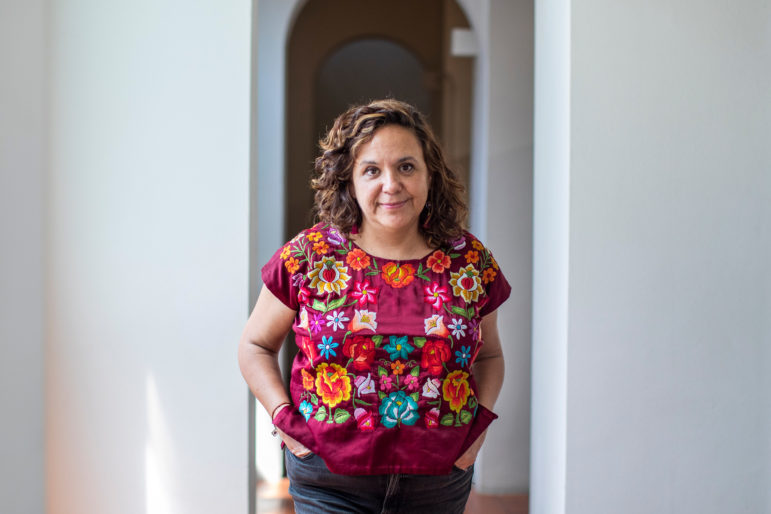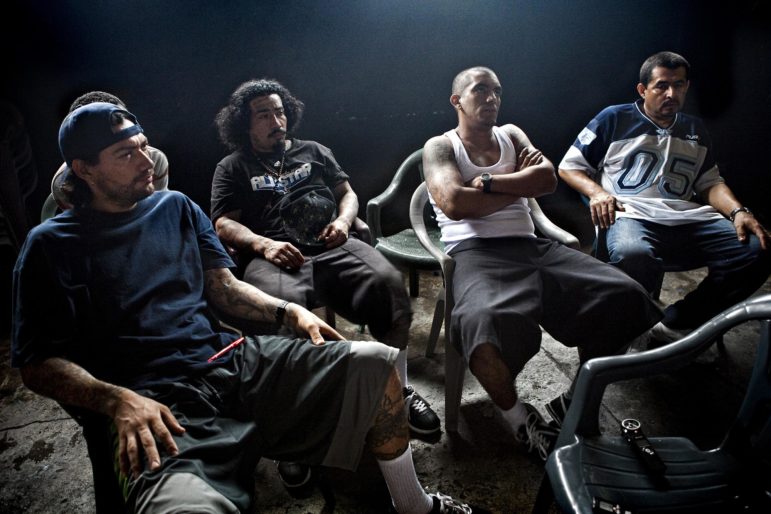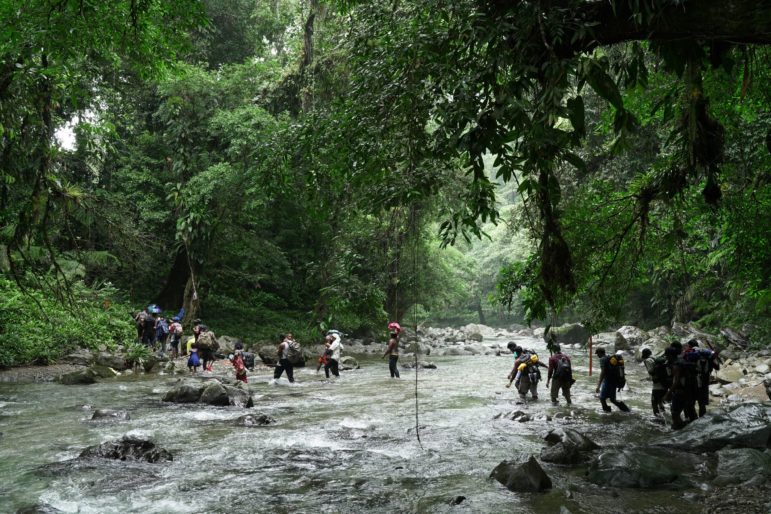

An illustration for an investigation into missing children in the northern Mexican state of Coahuila, by Border Hub grantee Luis Alberto López. Illustration: Courtesy of Carlos Mendoza
How an Investigative Hub Trained a Generation of Reporters in the US-Mexico Border Region
Read this article in
Missing children whose names were never published in the official local government database; people with elevated blood arsenic levels because of contaminated drinking water; and millions of Mexican pesos allegedly diverted by local governments to bogus companies across Mexico’s northern states: Border Hub’s journalism made it clear that investigative reporting in the border region between the US and Mexico is much more than just writing about migration.
The Mexico Border Investigative Reporting Hub — where I worked as an editor — was established in 2018, when a network of reporters, photographers, editors, and video producers decided to set up a training and development organization to help journalists combat corruption and champion positive change.
For years, investigative reporting in the border region had suffered from a lack of resources and training opportunities: access to workshops, conferences, and resources to conduct investigations was mostly limited to journalists from Mexico City or those that worked in large news organizations.
It was rare for stories and information to travel the thousands of kilometers between Mexico City and states like Chihuahua and Baja California, so journalists from these regions were in many ways excluded from Mexico’s mainstream media ecosystem.
The security situation in the region did not help. While reporters across Mexico have long faced difficulties in doing their work, since the border territory is disputed by drug traffickers, reporting here is complicated for journalists, who often resort to self censorship to protect themselves from threats. Similarly, harassment and intimidation from authorities seeking to hide acts of corruption make reporters vulnerable, and journalists battle with a lack of institutional protection.
But the rift between Mexico City and the border region began to close when, backed by grants from the International Center for Journalists (ICFJ) and the United States Agency for International Development (USAID), Border Hub launched an initiative to train and support journalists, recruiting team members through a social media-driven enrollment campaign.
Reporters from northern Mexico responded positively to the initial training calls, which began in 2019 in cities like Tijuana, Hermosillo, and Ciudad Juárez. The training sessions covered topics such as data journalism, access to public information, and the physical and digital security of journalists, tailored to the specific needs of each region. Reporters were later given support to refine their reporting projects, and had the chance to apply for fellowships. When the pandemic hit, the workshops continued, but this time, online.

A July 2022 photograph from a Border Hub training day in Hermosillo, Sonora, with reporters from across northern Mexico. Image: Courtesy of Priscila Hernández Flores
Priscila Hernández Flores, who was Border Hub’s community coordinator, says workshops, courses, and other virtual and in-person activities conducted in Border Hub’s target states were crucial for encouraging connections between journalists.
“Given our colleagues on the border have been victims of Mexico’s violence and insecurity, trust building was the main challenge we overcame when strengthening our community and creating a network of journalists,” she says. “Virtual meetings connected journalists with each other, and with organizations that explained how they conducted their own investigations from an academic perspective, so journalists could apply those tools to their reporting.”
The results speak for themselves: between 2019, when the first grants were handed out, and 2024, new muckrakers trained through the Hub published 200 investigative pieces that exposed a broad range of hidden truths. Over the five years it was operating, the Border Hub trained 1,300 people in different areas, all aimed at strengthening tools for long-term reporting.
“This was a watershed moment in my professional development,” explains Luis Alberto López, from Torreón, Coahuila, an alumni of the training program whose story we tell below. “I went from being a beat reporter to an investigative journalist.”
Silber Meza Camacho, investigative unit director at El Universal, one of Mexico’s most respected news outlets, says training journalists in the Mexican regions is crucial.
“Border Hub’s five-year project was extremely helpful in training journalists on a wide range of research areas and security measures, and it was a space where ideas about improving ethical best practices were shared… I believe the model is very interesting. It should continue and be replicated in other Mexican states.”

Rocío Gallegos Rodríguez, co-founder and editorial director of the Ciudad Juarez-based investigative outlet La Verdad, at the US-Mexico border. Image: Courtesy of Silber Meza Camacho
Rocío Gallegos Rodríguez, co-founder and editorial director of La Verdad, an investigative journalism outlet from Ciudad Juárez, Chihuahua, and a founder of the Juárez Journalist Network, says journalism in border regions has been conducted “under crossfire” for the past few years, making alliances crucial.
“Covering the border is difficult because organized crime groups spread violence and commit drug, weapons, and human trafficking in the region,” she explains. “Border region journalists have had to face many challenges and we’ve struggled to prevail doing journalism. To conduct coverage safely and thoroughly, one of the best solutions we’ve found is finding strength in numbers, and establishing networks with other journalists and news outlets.”
Although ICFJ and USAID’s five-year project funding has now ended, the community of border journalists and their alliances with civil society organizations are designed to last. Border Hub has trained up a whole cohort of investigative reporters, who continue to communicate and collaborate. And there is an ongoing WhatsApp chat where former Hub reporters share ideas, job opportunities, and fellowships, but above all, where they alert each other about security in their regions, guiding safer coverage.
To bookend this stage of the project, below we profile three of the reporters who received support from the Border Hub, setting out how training in investigative reporting helped them with specific stories, and even, in one case, with the larger-scale project of setting up an independent news outlet.
Investigating Government Contracts, Missing Children, and Toxic Water
Luis Alberto López is a correspondent in his home state of Coahuila for Milenio newsgroup, a multimedia news platform that produces a print newspaper and a television channel. He never thought submitting a proposal to a Border Hub production grant in late 2020, when the pandemic still dominated the news cycle, would change the path of his career.

Luis Alberto López, a reporter from Coahuila, has used his Border Hub training and experiences to start his own investigative outlet, Open Wounds. Image: Courtesy of Luis Alberto López
When he heard the local state government had assigned a budget of roughly US$43.5 million to build a rapid transit bus system, he knew the scale of this expense demanded closer attention.
“This first piece involved going from mere official pronouncements to open source data, FOIA requests, and tools such as public commerce registries, to figure out which companies were involved in the transport system’s construction,” López recalls.
He received three months of personalized mentoring, during which he learned how to build a hypothesis, create a work schedule, determine his sources, and use transparency platforms.
The result was The Unending Route of the Laguna Metrobus, a piece that revealed inefficient government spending, omissions by public officials, lack of accountability, and resource management opacity in a project meant to improve public transportation for 250,000 people.
A few years later, and again with Border Hub support, he turned to a human-rights based investigation, with a story about the disappearance of minors in Coahuila, an investigation that showed how missing children were doubly victimized when their cases were misregistered by state and federal authorities.
“Out of the pieces I published this one had the most impact, because it proved irregularities in the National Registry of Missing Persons, revealed problems with its database and counting method, and foresaw the need for a missing persons census,” López explained. His reporting was shortlisted for the Breach / Valdez Journalism and Human Rights Award, which recognizes national and international work centered on human rights.
Then in April 2023, López published a story about arsenic levels in water supplies in Coahuila, an investigation revealing how national and state health authorities had neglected to properly address arsenic-contaminated water in the region for decades, and the resulting impact on public health.
Aside from support working on specific stories, Lopez also used the Border Hub for support when setting up his own news outlet: Open Wounds. “With the grant I consolidated my independent news outlet, centered on human rights and memory,” said López, whose outlet now has a staff of nine people.
He offers one key piece of advice to aspiring investigative journalists: persistence.
“Don’t give up. Before the Border Hub grant, I knocked on different doors looking for financial aid. Sometimes I received it and others I didn’t. The key is to keep pushing and stay persistent in doing the kind of journalism we believe in,” he said.
Using Data Journalism as an Investigative Tool
Jesús Ibarra Félix is a freelance reporter from Hermosillo, Sonora, a city 400 kilometers (248 miles) south of Tucson, Arizona. He published three investigative pieces with Border Hub support between 2019 and 2023.

The reporter Jesús Ibarra Felix, who is based in Hermosillo, Sonora, and carried out three investigative stories thanks to the support of the Border Hub. Image: Courtesy of Jesús Ibarra Felix
“Border Hub enabled a shared work culture, and provided support that went from building a research matrix, a work timeline, and a budget, to having a clear, logical, and coherent hypothesis,” he says about his experience.
For one investigation, Ibarra used data journalism skills learned with the Border Hub to design a database that found municipal governments had been paying irregular firms and companies, using false contract schemes to divert resources. “We found 222 million pesos (US$11.1 million) were paid to these companies in a structured, systematic, and periodic way throughout Sonora state and mainly in the Nogales municipality,” he explains.
Experience gained with that piece enabled him to tackle even more complex investigations, in which he has analyzed contracts, receipts, supplier registers, and huge databases.
“You have to commit to your topic and become obsessed with finding the truth, being precise, and as objective as possible,” Ibarra says. “If you don’t become an obsessive creature under those conditions, you won’t achieve results, no matter how wonderful your topic is.”
And for the training, he is grateful. “The experience of the Border Hub and the great community around it taught us that it is possible to conduct investigative journalism in Mexico in a systematic, methodological, disciplined way, and with impact, while avoiding and minimizing the potential for legal harassment or attacks that could threaten people’s physical safety,” he said.

An infographic for the investigation conducted by Ibarra that dug into government payments paid to “ghost” companies. Illustration: Courtesy of Carlos Mendoza
Mastering FOIA to Unveil Corruption
Miriam Ramírez is a journalist from Sinaloa who has covered issues related to drug trafficking, corruption, politics, and human rights for more than a decade. She currently works for El Universal in the newspaper’s investigative and data division. She wanted to use investigative journalism to dive into corruption, the symptoms of which can be seen in the diversion of government resources from basic public services like road building and supporting underprivileged children.
Ramírez was already familiar with FOIA requests when she came to the Border Hub, but reinforced her knowledge of access to public information thanks to specialized mentorship and support from the program. Her project saw her tracking down tax receipts for payments made by the authorities: “We received an incredible amount of information. Thousands of receipts from payments made by several state and municipal administrations. It was very interesting to see how even state legislatures had used bogus companies to divert public funds,” said Ramírez.

The investigative reporter Miriam Ramírez, who emphasizes the importance of being trained in the right tools. Image: Courtesy of Miriam Ramírez
The resulting investigation – Paper Borders – laid bare how public institutions fraudulently divert public funds, and simulate expenses, public works, and services. According to Ramírez, this report wouldn’t have been possible without proper time management skills and the right training.
“It’s important to let go of all fear and prejudice regarding investigative journalism. We’re often told there’s not enough time to conduct an investigation or delve deeper with your reporting, but you have to make the effort, have patience, and use the tools available,” she said.
Ramírez said Mexico has many tools journalists can rely on, such as the National Transparency Platform and the Public Commerce Registry’s webpage, where all business records are found, but said training and making the time to learn how to use them is key for those hoping to transition into investigative reporting.
“Training is essential. If we’re not trained in our jobs, we need to find workshops and courses on our own,” Ramírez said.
 Priscila Cárdenas is an investigative reporter and teacher based in Sonora, Mexico. She specializes in issues of access to information, accountability, and transparency. She was an editor at the Border Hub, is responsible for investigative reporting on the digital platform Proyecto Puente, and oversees the Sonora Observatory for Access to Public Information. In 2019, she won a national journalism award in Mexico and received an honorable mention from the Inter-American Press Association for an investigation published by Connectas, Proyecto Puente, and Aristegui News.
Priscila Cárdenas is an investigative reporter and teacher based in Sonora, Mexico. She specializes in issues of access to information, accountability, and transparency. She was an editor at the Border Hub, is responsible for investigative reporting on the digital platform Proyecto Puente, and oversees the Sonora Observatory for Access to Public Information. In 2019, she won a national journalism award in Mexico and received an honorable mention from the Inter-American Press Association for an investigation published by Connectas, Proyecto Puente, and Aristegui News.









